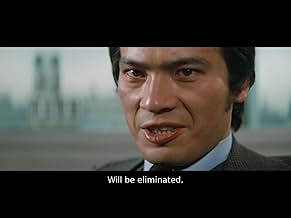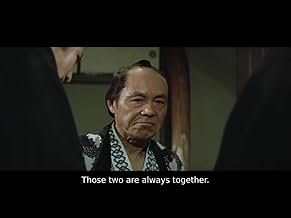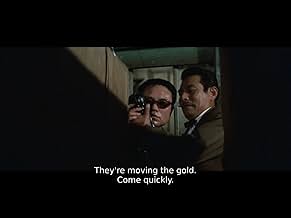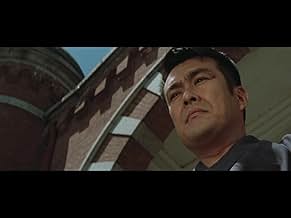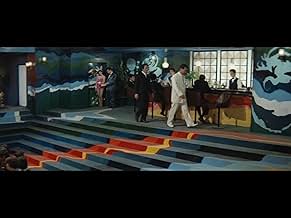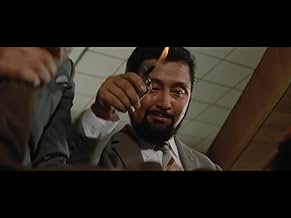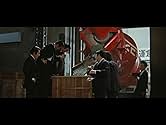Agrega una trama en tu idiomaA story of yakuza lynching during the Edo, Taisho, and Showa periods.A story of yakuza lynching during the Edo, Taisho, and Showa periods.A story of yakuza lynching during the Edo, Taisho, and Showa periods.
- Dirección
- Guionistas
- Elenco
- Dirección
- Guionistas
- Todo el elenco y el equipo
- Producción, taquilla y más en IMDbPro
Opiniones destacadas
Whatever other labels one may append to this feature, "exploitation" may be the most fitting of all as we're greeted even over the opening credits with scenes of the extreme violence to come. In a title telling three stories across three time periods, that violence is more of a unifying factor than the overarching notion of strict rules among yakuza, and the way that lives are governed and destroyed by those rules. Mind you, even with that tenor in mind, this is quite well made, meeting the production standards of its contemporaries - production standards which, truthfully, tend to be more vibrant than their modern equivalent. It won't appeal to all, and it's definitely flawed in the first place, but for those who are open to what 'Yakuza law' has to offer, it's good enough to warrant checking out if one has the chance.
Fast-paced and fairly chaotic as the picture is, Ishii Teruo's direction is more firm and focused than his writing. Vivid stunts, effects, and action sequences (including that major blood and gore), invariably intense and spirited performances, Furuya Osamu's lush, dynamic cinematography, and indeed the orchestration of shots and scenes can all be broadly credited to that direction. Ishii is also responsible, in turn, for the narrative looseness of the first segment, set during the Edo period, in which a boss' rigid adherence to rules effectively leads to the implosion of an entire organization. The second segment, set following the Meiji restoration, shows that same split in its own way between fine craftsmanship and less polished conception; we're thrown headlong into the plot, and are greeted with an abrupt time skip, in writing that feels somewhat harried. I do think that the screenplay is at least more careful in the second portion, with characters, scene writing, and plot that is more well defined as scheming family members exploit the yakuza code for their own ends. Incredibly, the third segment set in contemporary Japan is even more forthright with its action-oriented crime thriller thrust, and the violence is still more extreme. Now, it rather seems to me that the overarching notion of the yakuza code altogether gets lost in this last third alongside any particular details of the story - though in fairness, the movie at large finds success in the general much more than the specific.
Meanwhile, the flick really is splendidly made in every other capacity. The techniques and technology of the 60s with regards to cinematography, and film and color processing, are frankly tend to be more rich and flavorful, and look better, than what has been developed in all the subsequent years; the flawlessness of modern sensibilities portends sterility, artificiality, and drab imagery. Such considerations only make the beautiful filming locations, exquisite production design and art direction, and fetching costume design, hair, and makeup all the more welcome. 'Yakuza law' even demonstrates a keen mind for mind for lighting, and robust sound design. Yagi Masao's dynamic music, adopting different instrumentation and vibes for each segment, provides adept complement for every scene in turn. Even the editing comes across as being fairly sharp in my opinion.
Across each segment the overall strength varies, and taken as a whole this isn't something that especially demands viewership. It is grimly entertaining, however, just as it is, and smartly made more than not. I wish only that Ishii had devoted more energy to his screenplay, because the most consistent aspect of these ninety-seven minutes - more than even the graphic, often difficult violence - is the weakness of storytelling that struggles to ever impart a cogent, cohesive, coherent narrative. A scattershot sense of "violence among yakuza" only gets us so far, and the violence would be far more meaningful if there were a solid, compelling plot to provide structure. Maybe that's not what Ishii ever intended in the first place, but if so, that doesn't make the result any better. I still think this is duly worthwhile on its own merits, but with that big problem staring down the entire runtime, 'Yakuza law' is perhaps best left for something to fill time on a quiet day.
Fast-paced and fairly chaotic as the picture is, Ishii Teruo's direction is more firm and focused than his writing. Vivid stunts, effects, and action sequences (including that major blood and gore), invariably intense and spirited performances, Furuya Osamu's lush, dynamic cinematography, and indeed the orchestration of shots and scenes can all be broadly credited to that direction. Ishii is also responsible, in turn, for the narrative looseness of the first segment, set during the Edo period, in which a boss' rigid adherence to rules effectively leads to the implosion of an entire organization. The second segment, set following the Meiji restoration, shows that same split in its own way between fine craftsmanship and less polished conception; we're thrown headlong into the plot, and are greeted with an abrupt time skip, in writing that feels somewhat harried. I do think that the screenplay is at least more careful in the second portion, with characters, scene writing, and plot that is more well defined as scheming family members exploit the yakuza code for their own ends. Incredibly, the third segment set in contemporary Japan is even more forthright with its action-oriented crime thriller thrust, and the violence is still more extreme. Now, it rather seems to me that the overarching notion of the yakuza code altogether gets lost in this last third alongside any particular details of the story - though in fairness, the movie at large finds success in the general much more than the specific.
Meanwhile, the flick really is splendidly made in every other capacity. The techniques and technology of the 60s with regards to cinematography, and film and color processing, are frankly tend to be more rich and flavorful, and look better, than what has been developed in all the subsequent years; the flawlessness of modern sensibilities portends sterility, artificiality, and drab imagery. Such considerations only make the beautiful filming locations, exquisite production design and art direction, and fetching costume design, hair, and makeup all the more welcome. 'Yakuza law' even demonstrates a keen mind for mind for lighting, and robust sound design. Yagi Masao's dynamic music, adopting different instrumentation and vibes for each segment, provides adept complement for every scene in turn. Even the editing comes across as being fairly sharp in my opinion.
Across each segment the overall strength varies, and taken as a whole this isn't something that especially demands viewership. It is grimly entertaining, however, just as it is, and smartly made more than not. I wish only that Ishii had devoted more energy to his screenplay, because the most consistent aspect of these ninety-seven minutes - more than even the graphic, often difficult violence - is the weakness of storytelling that struggles to ever impart a cogent, cohesive, coherent narrative. A scattershot sense of "violence among yakuza" only gets us so far, and the violence would be far more meaningful if there were a solid, compelling plot to provide structure. Maybe that's not what Ishii ever intended in the first place, but if so, that doesn't make the result any better. I still think this is duly worthwhile on its own merits, but with that big problem staring down the entire runtime, 'Yakuza law' is perhaps best left for something to fill time on a quiet day.
YAKUZA LAW: LYNCHING! is one of the latter films in Teruo Ishii's JOYS OF TORTURE series, and is honestly the only one I've had the chance to see as of this writing. It is a strong entry that deals with the subject of Yakuza principles, and the penalties for not abiding by their codes.
The film is divided into three parts - the first two taking place in feudal Japan, the last segment being more "modern" and set in the late 1960's. All three deal with those that have broken the Yakuza code, and their subsequent torture and dispatch. The last part is played more like a 70's style crime film, and feels somewhat mis-matched against the other two segments - but is still an enjoyable addition to the film.
There's plenty of violence in this one for those that are looking for that - a good bit happening before the opening credits are over. I think that this one will be of interest to most who enjoy the 60's/70's era samurai/pinky films. Strangely enough - there's no actual lynching taking place. There is a scene where a guy is hung (by his torso) from a helicopter and dragged around a beach - but I don't think that really qualifies as "lynching". Not as strong as the "unofficial sequel" to Ishii's first JOYS OF TORTURE film - SHOGUN'S SADISM (aka OXEN SPLIT TORTURE) - but definitely in the same vain. LYNCHING! is definitely worth a look to Japanese exploit fans. 8/10
The film is divided into three parts - the first two taking place in feudal Japan, the last segment being more "modern" and set in the late 1960's. All three deal with those that have broken the Yakuza code, and their subsequent torture and dispatch. The last part is played more like a 70's style crime film, and feels somewhat mis-matched against the other two segments - but is still an enjoyable addition to the film.
There's plenty of violence in this one for those that are looking for that - a good bit happening before the opening credits are over. I think that this one will be of interest to most who enjoy the 60's/70's era samurai/pinky films. Strangely enough - there's no actual lynching taking place. There is a scene where a guy is hung (by his torso) from a helicopter and dragged around a beach - but I don't think that really qualifies as "lynching". Not as strong as the "unofficial sequel" to Ishii's first JOYS OF TORTURE film - SHOGUN'S SADISM (aka OXEN SPLIT TORTURE) - but definitely in the same vain. LYNCHING! is definitely worth a look to Japanese exploit fans. 8/10
Three stories for the price of one all concerning Yakuza and their laws. Just watch the opening credits that is full with torture and gore. Looked great from the start and it did for the first two stories taking place in old Japan. the last story takes place in the time being, the sixties.
But was I surprised for such an old movie that it contained so much blood and gore and even a bit of nudity. As I said, the first two parts are the best with a lot of fights going on and torture. Of course there are a few editing effects used but still the removal of an ear and the eye poking are gruesome to watch. In the last part we don't have katana's but guns so the torture is a bit different but the helicopter scene is still horrible.
Overall the acting was also good and for such an old flick the use of lighting was also well done. One of the earlier Japanese violence flicks and surely one to pick up. It also gives you an inside look into the Japanese way of living and traditions. Available on Shock DVD full uncut and uncensored.
Gore 3,5/5 Nudity 1/5 Effects 3/5 Story 3/5 Comedy 0/5
But was I surprised for such an old movie that it contained so much blood and gore and even a bit of nudity. As I said, the first two parts are the best with a lot of fights going on and torture. Of course there are a few editing effects used but still the removal of an ear and the eye poking are gruesome to watch. In the last part we don't have katana's but guns so the torture is a bit different but the helicopter scene is still horrible.
Overall the acting was also good and for such an old flick the use of lighting was also well done. One of the earlier Japanese violence flicks and surely one to pick up. It also gives you an inside look into the Japanese way of living and traditions. Available on Shock DVD full uncut and uncensored.
Gore 3,5/5 Nudity 1/5 Effects 3/5 Story 3/5 Comedy 0/5
This rousing, splendidly blood-thirsty portmanteau of lurid Yakuza conflict erupts in a bloody tsunami of gruesome eye-gouging, grisly evisceration, throat slashing and sanguineous Katana kills! Maestro, Teruo Ishii's infamously brutal trilogy of dramatically vengeful, gratuitously gore-grizzled Yakuza mayhem has manifestly lost none of its power to shock! Dynamic performances, visceral action scenes, diabolical treachery, desperate love, and hard won honour, 'The Yakuza's Law Lynching' is eventful, intelligent, bracingly violent Japanese exploitation at its most excitingly mean spirited. Vicious betrayals, Machiavellian plots, and savage, bullet-blasted reprisals,'The Yakuza's Law Lynching' remains entirely credible, a brutish, extraordinarily bellicose, generously crimson-splattered, eye-bogglingly cruel Torture classic. These three indelibly barbaric tales graphically portray the grimly mortal fates of those individuals who break the gleefully enforced Yakuza laws, since they do so at their own considerable peril!
An awesome film for the most part. Reminiscent of 'Casino' and 'Zatoichi' in its nature. Necessarily Violent as it depicts Yakuza law of an old-school variety.
This film is a great watch for those interested in old and new Yakuza films! This film is violent, i say this comparing it to newer Yakuza films & also the films in general circulation. This may look a bit out of date because it was the 70's but it's still pretty grim. Those bored by this should definitely be ashamed to write such off the ball reviews. I found the earlier eras covered to be more entertaining as i have not seen much of this before & i enjoy Gordon Liu and Zatoichi films too. I would say it is a must see Japanese Yakuza film along with 'Street Mobster' and 'The Yakuza Papers: Battles Without Honour Or Humanity'.
Relentless in places, baring likeness to old martial arts films ('Zatoichi' for the swords)... Good for people who don't mind the 70's style of film and even if you don't but like newer Yakuza films - watch it - it's a bit of history in Yakuza ways & law.
This film is a great watch for those interested in old and new Yakuza films! This film is violent, i say this comparing it to newer Yakuza films & also the films in general circulation. This may look a bit out of date because it was the 70's but it's still pretty grim. Those bored by this should definitely be ashamed to write such off the ball reviews. I found the earlier eras covered to be more entertaining as i have not seen much of this before & i enjoy Gordon Liu and Zatoichi films too. I would say it is a must see Japanese Yakuza film along with 'Street Mobster' and 'The Yakuza Papers: Battles Without Honour Or Humanity'.
Relentless in places, baring likeness to old martial arts films ('Zatoichi' for the swords)... Good for people who don't mind the 70's style of film and even if you don't but like newer Yakuza films - watch it - it's a bit of history in Yakuza ways & law.
¿Sabías que…?
- ConexionesReferenced in Erotic-Grotesque and Genre Hopping: Teruo Ishii Speaks (2019)
Selecciones populares
Inicia sesión para calificar y agrega a la lista de videos para obtener recomendaciones personalizadas
Detalles
Contribuir a esta página
Sugiere una edición o agrega el contenido que falta

